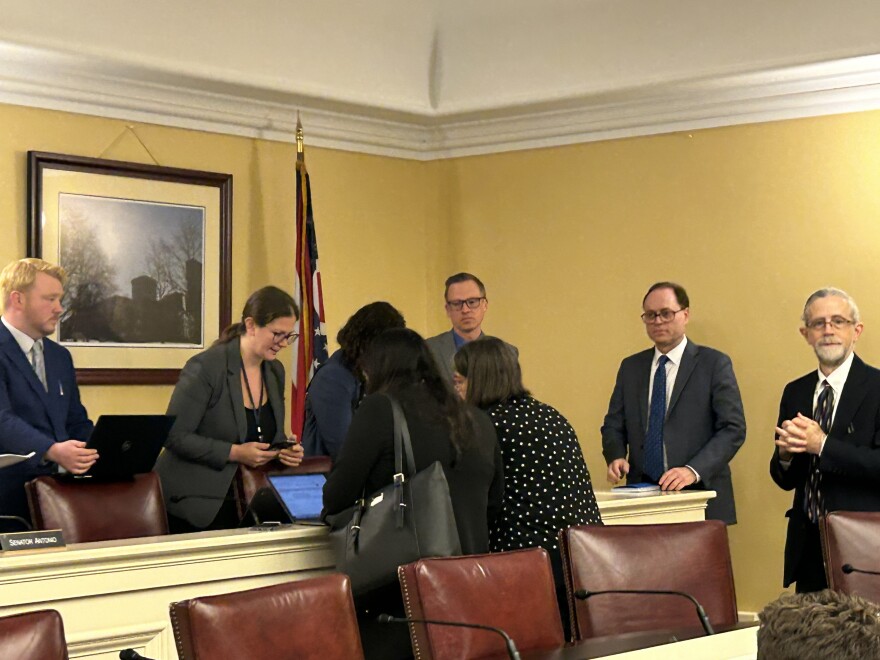Ohio lawmakers are voting Friday on a two-year state budget before the clock strikes midnight on the deadline for a new spending plan to be put into place.
Three members of the House and three members of the Senate have been working for days in a conference committee, trying to hammer out 880 differences between the plan passed by the House in April and the one the Senate passed last week.
The two-year budget totals $191.2 billion. The conference committee accepted most of the provisions in the Senate's tax plan, but made some changes. Senate Republicans had proposed $3.1 billion in personal income and businesss tax cuts by reducing the three income tax brackets in the House budget to two — 2.75% and 3.5%. And the Senate plan changes the state's main business tax, the commercial activity tax, so that 90% of businesses won't pay it after two years.
The compromise budget also includes near universal vouchers proposed by the Senate, so students attending private schools can get state money for them, regardless of their family's income. A family of four earning up to $135,000 a year would be able to qualify for a full voucher, with families earning more getting smaller vouchers.
But the House and Democrats got a win on school funding. The compromise budget fully funds the Fair School Funding Plan passed two years ago reduce reliance on property tax to pay for public education. The Senate had wanted to eliminate half a billion dollars from the House plan, including money guaranteed to some districts to offset a loss of per-pupil funding based on attendance. Those guarantees will remain intact.
House Finance Chair Jay Edwards (R-Nelsonville) said he's pleased with the budget being put forward for a vote.
"I think most of the things that we really cared about, we landed in the middle," Edwards said. And he said making sure K-12 public schools were properly funded according to the law that was passed two years ago was a key priority.
"The only thing that we had to fight for in this was to hold true to our vote two years ago to make sure we stay on the Fair School Funding Plan. We had to fight but we got there," Edwards said.
The budget includes a provision that takes power away from the partially elected state board of education and gives it to the governor. That mirrors Senate Bill 1, which has passed the Senate, and House Bill 12, which is still in committee. But a Senate-passed bill that would eliminate most diversity, equity and inclusion training at state universities and ban faculty strikes was stripped. Senate Finance Chair Matt Dolan said he was disappointed that didn't make it in.
"But there are some provisions that did get in that will allow us to expand access or opportunities for children to get educated in different forums, open to all political ideas and thoughts," Dolan said.
The budget also includes a Republican plan to establish five so-called "free speech institutes" at Ohio State University, the University of Toledo, Cleveland State University, the University of Cincinnati and Miami University. And the Senate was successful in keeping a provision prohibiting universities from requiring students have certain vaccinations, including those for meningitis and measles.
Other budget provisions include:
- A two-week sales tax holiday in August 2024, estimated to cost $750 million
- A ban on local governments from outlawing tobacco sales
- A requirement that social media companies verify age and parental consent for users under 16
- An income limit for subsidized childcare at 145% of the federal poverty level
This budget includes $39.5 million each year for food banks, restoring some funding removed in the Senate budget. And a requirement for Supplemental Nutrition Assistance Program (SNAP) cards to bear a photo and a phone number of an adult in the household getting that benefit in the Senate plan was was removed. So was a Senate provision that would have nearly eliminated a work-from-home option for state workers.
House Democrats had voted for that chamber's budget, but not one of the seven Democrats in the Senate voted for their plan. Senate Minority Leader Nickie Antonio (D-Lakewood) said she doesn't like this version either.
"This budget benefits the wealthy and the well-connected but it leaves out low-income folks, people who are struggling, and frankly middle-class folks as well," Antonio said.
Antonio said she doesn't think this final budget provision will get much, if any, support from minority Democrats, at least in her chamber.
By law, the budget needs to pass by the end of today. Edwards said lawmakers will likely also pass a continuing provision to allow the state to operate status-quo while final touches are put on the document before Gov. Mike DeWine can sign it and possibly issue vetoes.






